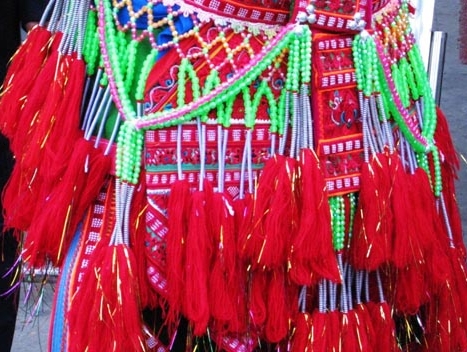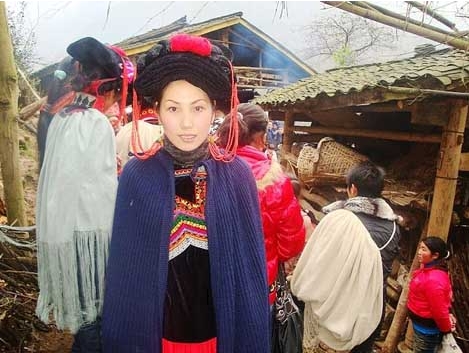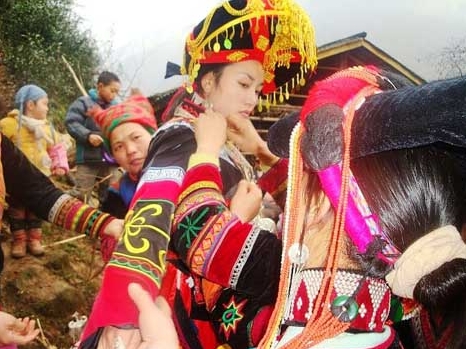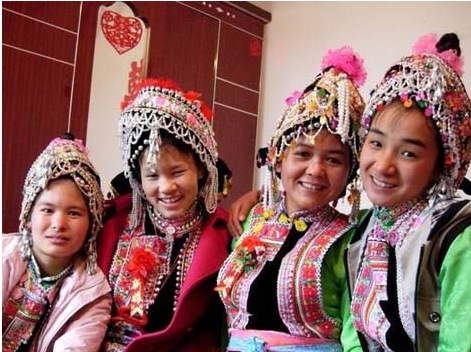



The wedding ceremony of Yi people is very interesting and bustling with excitement. When the young man and woman get acquainted and fall in love with each other and find each other congenial after their own hearts, the parents of the young man would invite the Bimo (a revered person in the ethnic group) to pick out a lucky day to hold the wedding ceremony with the approval of the parents of the young woman. During the several days before the wedding, the young woman is supposed to eat and drink less and shall not have anything right before heading to the bridal chamber in the young man's house.
During the wedding ceremony, the young man's family would put up in the middle of the yard a shed decorated with colored silk festoons in and outside with a gorgeous shrine for the Goddess of Luck in the middle of the shed. The Yi singers would sing without stop the Shed Melody in the shed.
When the escort procession from the bridegroom family arrives at the bride's home, they would be greeted with water-sprinkling, a symbol of welcome and congratulations. The Yi people believe that with sprinkling water, the bride would not have to go afar to carry water in her husband's family and would have adequate food and water even in case of drought. After entering the house, the escort party is supposed to burn joss sticks and kowtow in front of the altar before demonstrating the presents they have brought with, so would the bride's family show the trousseaux. And then the singer would begin to sing wedding songs, one at a time for each demonstration. Betrothal gifts would be showed as required by the songs. Otherwise, the singer would hit three strokes to the head of the escort men with a dustpan.
When the betrothal gifts are shown, the bride's family would entertain the bridegroom's escort with drink - tea first and then sweet water, which is known as "bitter first and sweet later". Then the incense burner table would be prepared to invite the uncles of the bride to give blessings and say something lucky. After that, they would open the red box and put two red silk stripes on the bridegroom. When all is over, the bride's family would arrange banquet to entertain the bridegroom's their relatives and friends. During the banquet, the bridegroom would make a bow and toast at each table. After all guests finish their dinner, the groom could finally escort the bride back home.
When all above-mentioned activities are carried out one after another as scheduled, the bride would generally dress and make up upstairs. Before leaving the bride's family, the bridegroom would be led by the bride's uncle to the memorial tablets of the bride's ancestors to bid farewell, while the bride would be carried on the back of her brother downstairs to outside the central room to join the bridegroom and head for his house together with matchmaker behind hailing all guests of the bride's family to accompany the bride straight to the bridegroom's house. According to the rules of the Yi ethnic group, the escort team should walk their way to the groom's family however far it is. In recent years, however, some people would take vehicles instead.
When they get to the doorway of the bridegroom's house, firecrackers would be set off and Bimo would be invited to chant Scripture of Wedding. Accompanied by two girls holding two torches, the bride would walk through the gate, go straight to the bridal chamber and sit on the bed. Then the bride and bridegroom would drink the nuptial cup. In accordance with the traditional custom, the bride should not have super in the bridegroom's family that day. Bridesmaid would heat the meal brought from the bride's family for the bride and invite the bridegroom to take the meal together. Then a banquet would be arranged by the bridegroom's family to entertain all guests. Everybody would enjoy themselves by sing and dance around the bonfires.
At dawn, the bride would carry two buckets of water to the kitchen and make a fire in the kitchen stove, indicating that she begins to make a fire and cook meal in the bridegroom's family and would live with the bridegroom from then on. On that day, the bridegroom's family would invite all guests of the same family clan to dinner. Two days later, the bride would return to her parents' home, which is commonly referred to as "huimen" (returning home).
During the wedding ceremony, the young man's family would put up in the middle of the yard a shed decorated with colored silk festoons in and outside with a gorgeous shrine for the Goddess of Luck in the middle of the shed. The Yi singers would sing without stop the Shed Melody in the shed.
When the escort procession from the bridegroom family arrives at the bride's home, they would be greeted with water-sprinkling, a symbol of welcome and congratulations. The Yi people believe that with sprinkling water, the bride would not have to go afar to carry water in her husband's family and would have adequate food and water even in case of drought. After entering the house, the escort party is supposed to burn joss sticks and kowtow in front of the altar before demonstrating the presents they have brought with, so would the bride's family show the trousseaux. And then the singer would begin to sing wedding songs, one at a time for each demonstration. Betrothal gifts would be showed as required by the songs. Otherwise, the singer would hit three strokes to the head of the escort men with a dustpan.
When the betrothal gifts are shown, the bride's family would entertain the bridegroom's escort with drink - tea first and then sweet water, which is known as "bitter first and sweet later". Then the incense burner table would be prepared to invite the uncles of the bride to give blessings and say something lucky. After that, they would open the red box and put two red silk stripes on the bridegroom. When all is over, the bride's family would arrange banquet to entertain the bridegroom's their relatives and friends. During the banquet, the bridegroom would make a bow and toast at each table. After all guests finish their dinner, the groom could finally escort the bride back home.
When all above-mentioned activities are carried out one after another as scheduled, the bride would generally dress and make up upstairs. Before leaving the bride's family, the bridegroom would be led by the bride's uncle to the memorial tablets of the bride's ancestors to bid farewell, while the bride would be carried on the back of her brother downstairs to outside the central room to join the bridegroom and head for his house together with matchmaker behind hailing all guests of the bride's family to accompany the bride straight to the bridegroom's house. According to the rules of the Yi ethnic group, the escort team should walk their way to the groom's family however far it is. In recent years, however, some people would take vehicles instead.
When they get to the doorway of the bridegroom's house, firecrackers would be set off and Bimo would be invited to chant Scripture of Wedding. Accompanied by two girls holding two torches, the bride would walk through the gate, go straight to the bridal chamber and sit on the bed. Then the bride and bridegroom would drink the nuptial cup. In accordance with the traditional custom, the bride should not have super in the bridegroom's family that day. Bridesmaid would heat the meal brought from the bride's family for the bride and invite the bridegroom to take the meal together. Then a banquet would be arranged by the bridegroom's family to entertain all guests. Everybody would enjoy themselves by sing and dance around the bonfires.
At dawn, the bride would carry two buckets of water to the kitchen and make a fire in the kitchen stove, indicating that she begins to make a fire and cook meal in the bridegroom's family and would live with the bridegroom from then on. On that day, the bridegroom's family would invite all guests of the same family clan to dinner. Two days later, the bride would return to her parents' home, which is commonly referred to as "huimen" (returning home).
Source:
http://traditions.cultural-china.com/en/115Traditions5080.html





